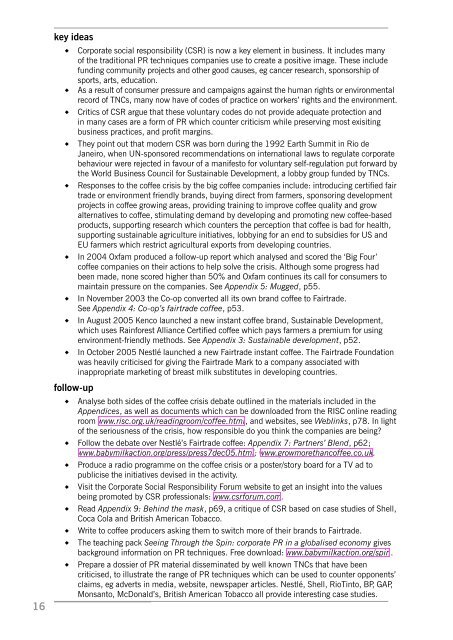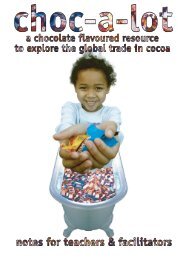Cost of coffee.indd - RISC
Cost of coffee.indd - RISC
Cost of coffee.indd - RISC
Create successful ePaper yourself
Turn your PDF publications into a flip-book with our unique Google optimized e-Paper software.
16<br />
key ideas<br />
◆<br />
◆<br />
◆<br />
◆<br />
◆<br />
◆<br />
◆<br />
◆<br />
◆<br />
Corporate social responsibility (CSR) is now a key element in business. It includes many<br />
<strong>of</strong> the traditional PR techniques companies use to create a positive image. These include<br />
funding community projects and other good causes, eg cancer research, sponsorship <strong>of</strong><br />
sports, arts, education.<br />
As a result <strong>of</strong> consumer pressure and campaigns against the human rights or environmental<br />
record <strong>of</strong> TNCs, many now have <strong>of</strong> codes <strong>of</strong> practice on workers’ rights and the environment.<br />
Critics <strong>of</strong> CSR argue that these voluntary codes do not provide adequate protection and<br />
in many cases are a form <strong>of</strong> PR which counter criticism while preserving most exisiting<br />
business practices, and pr<strong>of</strong>it margins.<br />
They point out that modern CSR was born during the 1992 Earth Summit in Rio de<br />
Janeiro, when UN-sponsored recommendations on international laws to regulate corporate<br />
behaviour were rejected in favour <strong>of</strong> a manifesto for voluntary self-regulation put forward by<br />
the World Business Council for Sustainable Development, a lobby group funded by TNCs.<br />
Responses to the c<strong>of</strong>fee crisis by the big c<strong>of</strong>fee companies include: introducing certified fair<br />
trade or environment friendly brands, buying direct from farmers, sponsoring development<br />
projects in c<strong>of</strong>fee growing areas, providing training to improve c<strong>of</strong>fee quality and grow<br />
alternatives to c<strong>of</strong>fee, stimulating demand by developing and promoting new c<strong>of</strong>fee-based<br />
products, supporting research which counters the perception that c<strong>of</strong>fee is bad for health,<br />
supporting sustainable agriculture initiatives, lobbying for an end to subsidies for US and<br />
EU farmers which restrict agricultural exports from developing countries.<br />
In 2004 Oxfam produced a follow-up report which analysed and scored the ‘Big Four’<br />
c<strong>of</strong>fee companies on their actions to help solve the crisis. Although some progress had<br />
been made, none scored higher than 50% and Oxfam continues its call for consumers to<br />
maintain pressure on the companies. See Appendix 5: Mugged, p55.<br />
In November 2003 the Co-op converted all its own brand c<strong>of</strong>fee to Fairtrade.<br />
See Appendix 4: Co-op’s fairtrade c<strong>of</strong>fee, p53.<br />
In August 2005 Kenco launched a new instant c<strong>of</strong>fee brand, Sustainable Development,<br />
which uses Rainforest Alliance Certified c<strong>of</strong>fee which pays farmers a premium for using<br />
environment-friendly methods. See Appendix 3: Sustainable development, p52.<br />
In October 2005 Nestlé launched a new Fairtrade instant c<strong>of</strong>fee. The Fairtrade Foundation<br />
was heavily criticised for giving the Fairtrade Mark to a company associated with<br />
inappropriate marketing <strong>of</strong> breast milk substitutes in developing countries.<br />
follow-up<br />
◆ Analyse both sides <strong>of</strong> the c<strong>of</strong>fee crisis debate outlined in the materials included in the<br />
Appendices, as well as documents which can be downloaded from the <strong>RISC</strong> online reading<br />
room www.risc.org.uk/readingroom/c<strong>of</strong>fee.html, and websites, see Weblinks, p78. In light<br />
<strong>of</strong> the seriousness <strong>of</strong> the crisis, how responsible do you think the companies are being?<br />
◆ Follow the debate over Nestlé’s Fairtrade c<strong>of</strong>fee: Appendix 7: Partners’ Blend, p62;<br />
www.babymilkaction.org/press/press7dec05.html; www.growmorethanc<strong>of</strong>fee.co.uk.<br />
◆ Produce a radio programme on the c<strong>of</strong>fee crisis or a poster/story board for a TV ad to<br />
publicise the initiatives devised in the activity.<br />
◆ Visit the Corporate Social Responsibility Forum website to get an insight into the values<br />
being promoted by CSR pr<strong>of</strong>essionals: www.csrforum.com.<br />
◆ Read Appendix 9: Behind the mask, p69, a critique <strong>of</strong> CSR based on case studies <strong>of</strong> Shell,<br />
Coca Cola and British American Tobacco.<br />
◆ Write to c<strong>of</strong>fee producers asking them to switch more <strong>of</strong> their brands to Fairtrade.<br />
◆ The teaching pack Seeing Through the Spin: corporate PR in a globalised economy gives<br />
background information on PR techniques. Free download: www.babymilkaction.org/spin.<br />
◆ Prepare a dossier <strong>of</strong> PR material disseminated by well known TNCs that have been<br />
criticised, to illustrate the range <strong>of</strong> PR techniques which can be used to counter opponents’<br />
claims, eg adverts in media, website, newspaper articles. Nestlé, Shell, RioTinto, BP, GAP,<br />
Monsanto, McDonald’s, British American Tobacco all provide interesting case studies.




